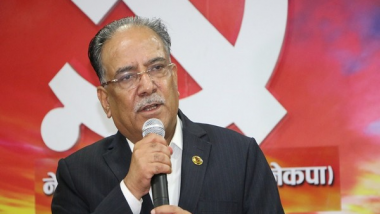New Delhi, July 17: India and Nepal need to address diplomatically some of the issues "left by history" to realise the full potential of the bilateral cooperation, former Nepalese prime minister Pushpa Kamal Dahal, popularly known as Prachanda, has said.
In an address at an event here last evening, the visiting leader particularly highlighted the need to resolve matters relating to the 1950 India-Nepal friendship treaty, boundary issue and the EPG (Eminent Persons Group) report. India and Nepal Unveil Joint Vision into Bilateral Cooperation in Power Sector.
The chairman of the Communist Party of Nepal was on a three-day visit to India from July 15 to 17 at the invitation of BJP President J P Nadda. "There are some issues left by history that need to be addressed in good faith to fully realise full potentials of Nepal-India relations and cooperation," he said in his address on India-Nepal relations.
"The matters related to the 1950 Treaty, boundary and EPG report need to be resolved through diplomatic efforts and dialogue. In the spirit of good neighbourliness, we can make our relations problem-free," he said.
The EPG was constituted a few years back to look into various aspects of India-Nepal ties including to look at the 1950 friendship treaty between the two countries. Nepal has been demanding a review of the treaty. The India-Nepal Treaty of Peace and Friendship of 1950 forms the bedrock of the special relations between the two countries.
Ties between the two countries came under strain after Kathmandu published a new political map in 2020 that showed the three Indian territories - Limpiyadhura, Kalapani and Lipulekh - as part of Nepal. On its part, India reacted sharply, calling it a "unilateral act" and cautioned Kathmandu that such "artificial enlargement" of territorial claims would not be acceptable to it.
In his address, Prachanda said India and Nepal have been aware of each other's "concerns and sensitivities" and that Kathmandu has not allowed its land to be used against the "interests of our neighbours and it expects similar assurance from India."
He said, "mutual trust" and respect for each other's sensitivities have helped in overcoming some "misunderstandings" in the past. Prachanda said the present coalition government of Nepal headed by Prime Minister Sher Bahadur Deuba attached great importance to its relations with India.
"We, as coalition partners, are of the view that our two countries should work together to fully harness the development potentials in order to uplift the living standard of our peoples who deserve a dignified life," he said.
Prachanda said Deuba's visit to India in April, and subsequent trip to Lumbini by Prime Minister Narendra Modi in May generated a "new momentum" in the ties.
"For Nepal, India remains the most important trade partner. It is the largest source of Nepal's imports as well as the largest destination of Nepal's exports," he said. The Nepalese leader also described achievements made by India in economic, social, scientific and other frontiers in recent years as "remarkable".
"India's development has been truly spectacular and inspiring. The people of Nepal stood by India during its struggle for independence. Nepal had provided moral as well as material support. Today, they are standing by the people of India in their quest for development," he said.
The former Nepalese PM said India's 'Neighbourhood First Policy' and its approach of Sabka Sath Sabka Vikas' (together with all, development for all) can provide momentum to both regional and sub-regional processes in South Asia, particularly in the areas of trade, transit, connectivity and hydropower. "Nepal is eager to welcome more investment from Indian investors and private sectors in hydropower," he said.
Prachanda also recalled India's support to Nepal in dealing with the COVID-19 pandemic as well when it was struck by a devastating earthquake in 2015.
"India has continued its support to Nepal including by unhindered supply of goods, medical supplies and much-needed vaccines. We are thankful to the government and people of India for the generous assistance extended to Nepal during difficult times, including in the aftermath of the devastating earthquakes in 2015," he said.
Prachanda said the response from India in the wake of the earthquakes was "swift, spontaneous and substantial". "We greatly value India's support in post-earthquakes reconstruction," he added. Nepal is important for India in the context of its overall strategic interests in the region, and the leaders of the two countries have often noted the age-old "Roti Beti" relationship.
The country shares a border of over 1850 km with five Indian states – Sikkim, West Bengal, Bihar, Uttar Pradesh and Uttarakhand. Land-locked Nepal relies heavily on India for the transportation of goods and services. Nepal's access to the sea is through India, and it imports a predominant proportion of its requirements from and through India.
(The above story is verified and authored by Press Trust of India (PTI) staff. PTI, India’s premier news agency, employs more than 400 journalists and 500 stringers to cover almost every district and small town in India.. The views appearing in the above post do not reflect the opinions of LatestLY)













 Quickly
Quickly


